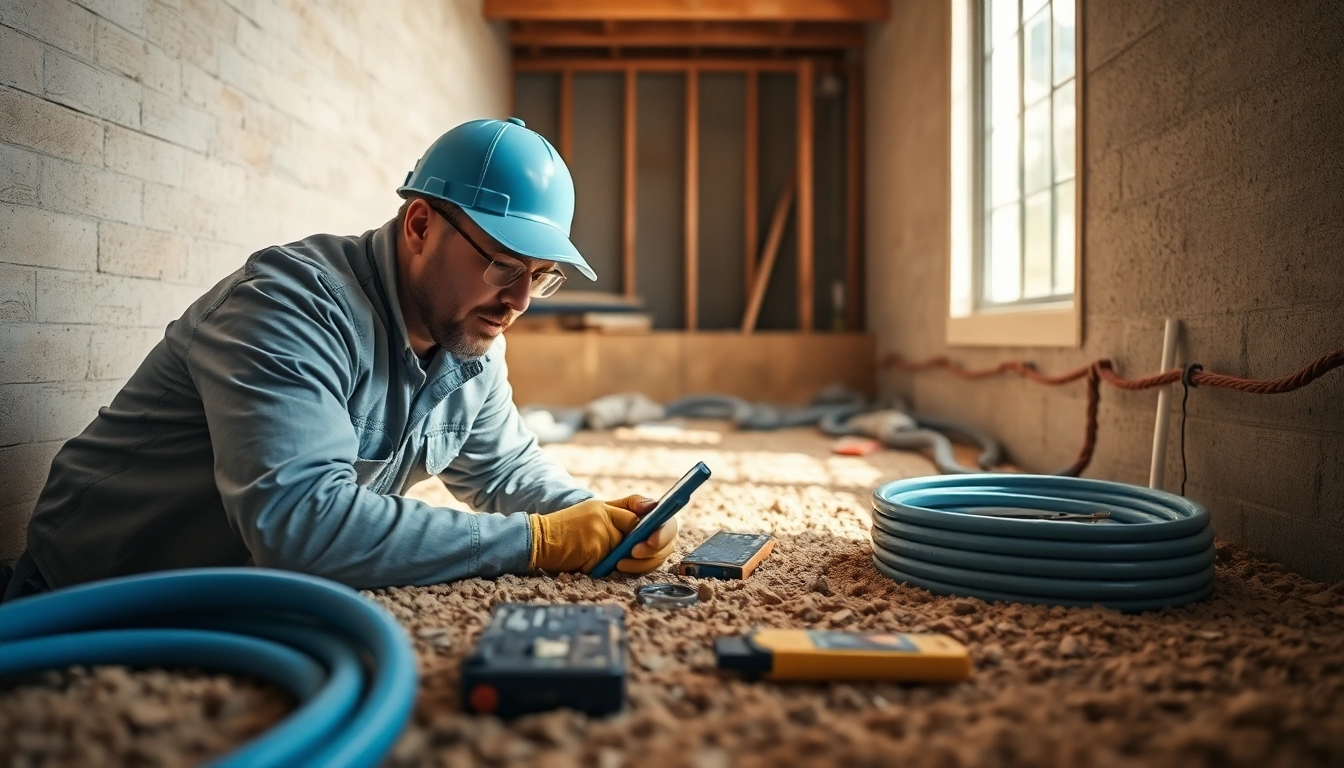
Understanding Basement Sealing
Basics of Basement Sealing
Basement sealing, essentially, is a critical process that involves applying various materials and methods to prevent water intrusion in the subterranean levels of buildings. This is especially vital in regions prone to heavy rainfall and fluctuating water tables. The sealing itself can be achieved through a range of techniques like interior and exterior waterproofing, crack repairs, and installing drainage systems that redirect water away from the basement area.
Typically, basement sealing jobs start with a thorough inspection of the basement, identifying areas where moisture may enter and determining the best methods to alleviate water intrusion. This may include solutions such as applying sealants on walls and floors, installing sump pumps, or even creating drainage systems outside the property.
Importance of Basement Sealing for Homes
The significance of properly sealing a basement cannot be overstated. A dry basement is essential for maintaining the overall health and safety of a home. Here’s why:
1. Structural Integrity: Water infiltration can weaken the foundation walls, leading to structural issues that could prove costly to repair.
2. Health Considerations: Moisture in basements creates an ideal environment for mold and mildew growth, which can lead to respiratory issues and other health problems for inhabitants.
3. Increased Property Value: A well-sealed basement can enhance the value of a property, making it more attractive to potential buyers. Homes with water-related issues often experience decreased marketability.
4. Energy Efficiency: Sealing the basement can also contribute to better energy efficiency by minimizing drafts and maintaining more consistent indoor temperatures.
Investing in the services of a reliable basement sealing company near me geneva not only provides peace of mind but also safeguards the physical and financial well-being of a property.
Common Myths About Basement Sealing
Despite its importance, there are several myths about basement sealing that can mislead homeowners. Breaking down these misconceptions is essential:
1. Myth: Sealing is a One-Time Fix: Many believe that sealing their basement once will suffice indefinitely. However, it often requires periodic maintenance and re-evaluation due to environmental changes and wear and tear.
2. Myth: All Sealants Are the Same: Not all sealing materials are designed for the same purpose. Different levels of moisture exposure call for specific types of sealants, from epoxy and polyurethane to cement-based options.
3. Myth: It’s an Unnecessary Expense: Some homeowners consider sealing to be an unnecessary expenditure, but the longer you wait to address moisture issues, the more severe the damage and the higher the costs.
4. Myth: Only Foundation Issues Require Sealing: While foundation damage is a common issue, moisture can enter basements through cracks in walls, poorly installed windows, or even through the floor, signaling the need for comprehensive sealing.
Signs You Need a Basement Sealing Company Near Me Geneva
Identifying Moisture Problems
Detecting moisture issues early on can save homeowners substantial time and money. Signs to look for include:
– Visible Water: Puddles or damp areas on the basement floor are clear indicators of moisture intrusion.
– Musty Odors: Persistent odors can signal the presence of mold, indicating moisture buildup.
– Water Stains: Dark patches on walls and floors often reveal previous water leaks, suggesting that the property may have serious moisture problems.
– Condensation: Excess moisture in the air can lead to condensation forming on windows, pipes, and walls.
Assessing Structural Impact from Water Damage
Once moisture is detected, assessing its impact on the structural integrity of the home is crucial. Look for:
– Cracks in the Foundation: Hairline cracks can expand over time due to water pressure, needing immediate attention.
– Bowing Walls: Walls that appear to bulge may indicate excess water pressure and should prompt a professional inspection.
– Soft Spots in Flooring: As the flooring weakens, it may become spongey or unstable, indicating severe water exposure.
It’s crucial to act rapidly when these indicators are present to prevent extensive damage.
When to Seek Professional Help
While some moisture issues may be manageable as DIY projects, others require the expertise of professionals. Consider hiring a sealing company if you:
– Identify multiple signs of water damage.
– Are unsure where the moisture is originating from.
– Notice recurring issues despite previous attempts at sealing.
– Need a comprehensive assessment of your basement’s waterproofing needs.
Choosing the Right Basement Sealing Company Near Me Geneva
Factors to Consider in Your Selection
Selecting a qualified basement sealing company is critical for effective results. Here are some key considerations:
1. Experience and Expertise: Look for companies that have years of experience and specific expertise in basement waterproofing.
2. Licensing and Insurance: Verify that potential contractors hold the appropriate licenses and insurance to mitigate liability.
3. Services Offered: Not all companies offer the same range of services. Ensure they can address your specific waterproofing needs.
4. Warranty and Support: A reliable company should provide warranties for their work, ensuring peace of mind about the long-term effectiveness of the sealing.
Questions to Ask Potential Contractors
Before committing to a contractor, consider asking the following questions:
– What methods do you recommend for sealing my basement, and why?
– Can you provide references from previous clients?
– How long do you expect the project to take?
– What kind of warranty do you provide for your work?
– How will you address any unexpected complications during the project?
These questions can help you gauge the company’s professionalism and approach to customer service.
Reading Reviews and Testimonials
In today’s digital age, reviews and testimonials play a significant role in assessing potential contractors. Look for:
– Reviews on independent platforms, not just the company’s website.
– Consistent feedback regarding service quality and effectiveness of results.
– Testimonials that mention specific services provided and overall client satisfaction.
These insights will offer a fuller picture of what you can expect from a potential contractor.
Basement Sealing Techniques and Solutions
Different Methods of Basement Sealing
Various techniques are employed in basement sealing, including:
1. Interior Waterproofing: This technique involves applying sealants to walls and floors, reducing moisture seepage from within.
2. Exterior Waterproofing: This preventative approach includes excavating around the foundation and applying waterproof membranes and drainage systems.
3. Crawl Space Encapsulation: For homes with crawl spaces, encapsulation can help manage humidity levels and protect from moisture.
4. Sump Pumps: Installing sump pumps is vital for managing water accumulation, especially in high-risk areas.
Each method has its advantages and best applications based on the specific moisture issues faced by the property.
Best Materials for Effective Sealing
Choosing the right materials is crucial for effective sealing outcomes:
– Epoxy Sealants: Excellent for filling cracks and sealing surfaces due to their strong adhesive properties.
– Polyurethane Sealants: Flexible and versatile, making them ideal for areas subject to movement.
– Cementitious Waterproofing: Generally used for external applications, these materials block moisture penetration effectively.
– Waterproof Membranes: Physically prevent water infiltration and provide a secondary line of defense in exterior waterproofing.
Selecting the right materials based on the specific site conditions can drastically enhance the longevity of the sealing.
Cost Analysis of Basement Sealing Options
Understanding the financial aspect is also an essential part of making informed decisions about basement sealing. Costs can vary widely based on factors such as:
– Condition of the Basement: Pre-existing damage may necessitate extensive repair work that can raise initial costs.
– Techniques Used: Interior methods generally cost less than extensive external waterproofing systems.
– Size of the Basement: Larger spaces often require more materials and time, increasing labor and supply costs.
– Geographic Variability: Local market rates for labor and materials can affect total costs.
On average, homeowners could spend anywhere from $1,500 to $15,000 depending on the complexity of the sealing process. It’s recommended to obtain several estimates from different contractors to get a clear understanding of the market rates in your area.
Post-Sealing Care and Maintenance
Monitoring Moisture Levels After Sealing
After completion of the sealing, continuous monitoring of moisture levels is crucial. This can be done through:
– Humidity Sensors: Install humidity sensors to measure the moisture levels in the air, ensuring they remain within a healthy range.
– Infrared Thermography: Using infrared thermography can help detect cold spots that may indicate hidden moisture issues.
Regular check-ins can help in identifying any potential issues before they escalate, maintaining the integrity of your basement.
Tips for Long-term Basement Health
Ensuring the health of your basement requires ongoing efforts:
1. Proper Ventilation: Maintaining airflow helps manage humidity levels, combating moisture build-up.
2. Regular Inspections: Schedule annual inspections with waterproofing professionals to catch emerging problems early.
3. Gutter Maintenance: Clean and maintain gutters to prevent overflow and ensure proper drainage away from the foundation.
4. Landscaping Management: Ensure that landscaping slopes away from the foundation to minimize water accumulation around the basement.
Implementing these practices can help sustain a dry and healthy basement environment long after the sealing job is complete.
When to Schedule Follow-up Assessments
Follow-up assessments are critical for verifying the effectiveness of sealing and for early detection of new issues. Consider scheduling these reviews:
– Annually: Regularly scheduled annual inspections ensure any emerging moisture issues are caught early.
– After Severe Weather: Following substantial storms or flooding, it’s wise to assess the basement for water intrusion.
– Signs of New Moisture Issues: Promptly investigate any new signs of moisture, odor, or wall and flooring changes.
Timely assessments can save costs down the line by avoiding severe structural damage due to neglect.





